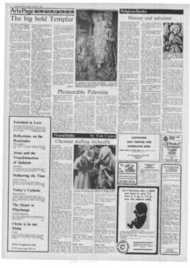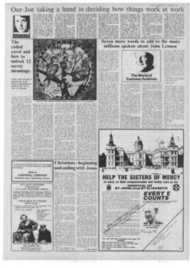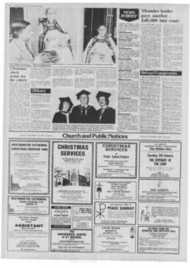Page 4, 19th December 1980
Page 4

Report an error
Noticed an error on this page?If you've noticed an error in this article please click here to report it.
Tags
Share
Related articles
Take It Out On `sir'
Corporal Punishment In Schools In Defence Of Catholic...
Letters On Corporal Punishment
Protest At Caning 'muddle'
To Beat Or Not To Beat?
Corporal punishment capital or not?
THE HEADING "Take it out on Sir" is hardly apt for Mr Gordon Dimmer's somewhat extravagantly worded letter, December 5, against properly administered corporal punishment.
I agree that discipline means collaboration with teachers; that Christ advocated punishment for those also deserve it, and in this he did not exclude juniors. In addition. He taught obedience.
But we are talking about Britain and not Ireland. I doubt if "being pushed and thumped" would be tolerated for one second _here. Of course fear would follow such irresponsible behaviour.
I did not say I had had frequent thrashings; the few I had were spaced over seven years — and merited.
Did they blur my vision to the nranifest moral injustice . which allows defenceless children to be thrashed by adults twice their size or more?"No. This is emotive nonsense:
". .. punishment and discipline being totally different if not contradictory".
Of course they are different. It does not follow that they arc contradictory. And it does not follow that the first cannot and does not produce the second. That is the intention in youth, as it is the intention in later life in prison. Naturally, the percentage of success is less at more advanced ages. "the lack of evidence that Christ
advocated corporal punishment (for disciples or children) punishment
Christ did not specifically advocate corporal punishment but spoke of obedience and of punishment for wrong-doing. He had to leave something to our commonsense and judgment just as He left many other things unspecified. He laid the broad guidelines and was specific where it mattered most.
"adults who still insist on the right to beat the living daylights out of other peoples' children". In what sort of community does Mr Dimmer live? Such arrant nonsense hardly needs answering. If there are excesses anywhere. there are swift means of dealing with them.
Cruelty does exist. We read about it. but hardly ever in schools. It happens in unfortunate or maladjusted families.
Punishment at the Vaughan was neither sadistic nor capricious. Only the headmaster had the power to sentence; the odd unjustified case may have got through but I doubt it, A thrashing produced painful swollen fingers for a few hours, and that was that. The results of such properly administered discipline are spread all over the country in the shape of men who have reached high professional, political and social status and who are respected for their correctness and self-discipline. They may not have entered the school like that. but they left it with the groundwork properly done.
TERENCE BRENTINI, November 21, incensed by STOPP's anticorporal punishment views, resorts to personal abuse — the last resort of a person who realises he has lost the argument. Even Mr Brentini admits that corporal punishment "does not always work" as a deterrent (educational research, in fact, shows that beating children is counterproductive). However, Mr Brentini "received a number of thrashings" and they did him "no harm". How does he know? And did they do him any good?
The fact is that corporal punishment can he damaging. Educationally — because fear and education are incompatible; Socially — because the message conveyed by a beating is that might is right, and that violence is an acceptable way of achieving one's objectives; psychologically — for both beater and beaten, having well documented connections with sado-masochism and pornography; physically recent cases include two 14-year-old boys who required hospital treatment for cuts and bruises on their buttocks, and a 16-year-old girl who was caned so viciously by a male teacher that a huge blood-blister Formed on her hand.
There is no place in a civilised society for this barbaric anachronism.
Tom Scott Education Secretary The Society of Teachers Opposed to Physical Punishment MR WHITE, December 5, rightly tells us that one of the most valuable lessons in growing up is the conquest of fear. But he then errs to the conclusion that the receiving of corporal punishment helps a boy to achieve such an aim.
Perhaps Mr White has some evidence that an oft-caned boy is better equipped to relax in the dentist's chair, for example, than one with an inviolate posterior.
Is not the moral toughness which we admire in a well-balanced normal boy achieved by more positive means than those which tend to wreck both nerves and trust in adult authority?
Was Churchill, who deplored the imposition of corporal punishment in schools, soft? Was Baden-Powell, who never advocated corporal punishment to Scouts, soft? Is the Duke of Edinburgh, who never hints that his Award Scheme participants should suffer the humiliation of corporal punishment, soft?
If we refer, as Mr White recommends, to St Luke, 12, v 47-48, can we infer that children should be beaten by adults? Ought we not rather to refer to the fact that the least beaten children enjoy the best chance of becoming "tough" in the best sense of the term, and that the most beaten children are the most apt to become "tough" in the worst possible sense?
Gordon Dimmer Bridgend, Callander WHAT IS sauce for Mr Tom Scott's goose, Nov 21, is sauce for the gander. Let us hope that, after the ruling of the European Commission on Human Rights that parents' wishes on the caning of their children are bound to he respected, those parents who are convinced of the value of corporal punishment will have the right to send their children to a school which carries out their wishes.
George Redmond Lion Surbiton. Surrey
blog comments powered by Disqus











